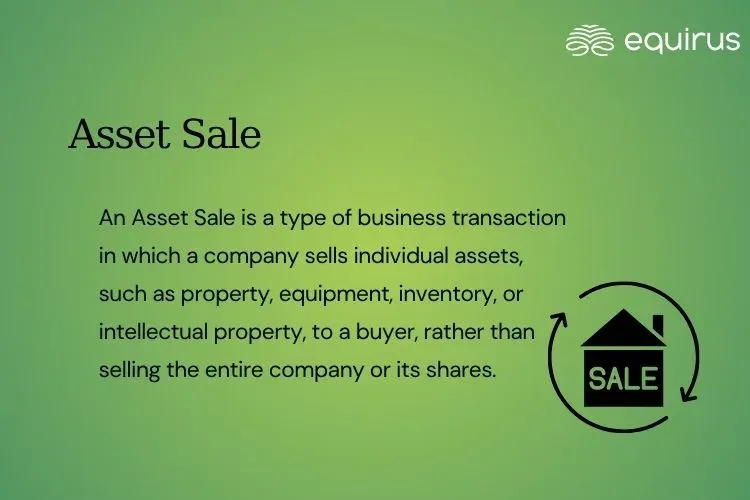Asset Sale

Key Highlights
-
An Asset Sale is a type of business transaction in which a company sells individual assets, such as property, equipment, inventory, or intellectual property, to a buyer, rather than selling the entire company or its shares.
-
Common assets in an asset sale includes land or buildings, machinery or vehicles, patents, trademarks, or software, customer lists or contracts, inventory and receivables and business divisions (partial sales).
What is Asset Sale?
An Asset Sale is a type of business transaction in which a company sells individual assets, such as property, equipment, inventory, or intellectual property, to a buyer, rather than selling the entire company or its shares.
In this transaction, the buyer selects specific assets and sometimes assumes certain liabilities, while the rest remain with the seller.
Key Characteristics
| Feature | Explanation |
|---|---|
| What is sold | Selected assets (e.g., plant, machinery, brand, customer contracts) |
| Ownership | The seller remains the owner of the company; only assets change hands |
| Liabilities | Only agreed-upon liabilities transfer to the buyer |
| Legal entity | The selling company continues to exist |
| Tax treatment | Tax is applied asset-by-asset (can be complex and varies by jurisdiction) |
Common Assets in an Asset Sale
- Land or buildings
- Machinery or vehicles
- Patents, trademarks, or software
- Customer lists or contracts
- Inventory and receivables
- Business divisions (partial sales)
Example
A manufacturing company decides to exit one of its business units. It sells:
- The factory building
- Machinery
- Inventory
- Contracts related to that unit
The rest of the company continues operating. This is an asset sale because only parts of the business are sold, not the entire company.
Why Choose an Asset Sale?
For the Seller:
- Can retain unwanted assets or liabilities
- Useful during partial exits or restructuring
For the Buyer:
- Can choose only desirable assets
- Avoids hidden liabilities
- Gains a "step-up" in asset value for depreciation (in some tax regimes)
In the Indian Context
In India, asset sales are governed by the Companies Act and Income Tax Act. Stamp duty, GST, and capital gains tax implications need careful consideration. Asset sales are commonly seen in:
- Distressed asset resolutions
- Company restructuring
- Partial divestments by conglomerates
